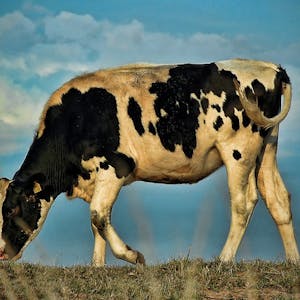Explore the impact of infectious disease on sustainable animal-based food production with the Sustainable Food Production Through Livestock Health Management course. Gain insights into growth, immunity, infection, and problem-solving skills essential for advancing animal health and food production. This course addresses the growing need for individuals capable of integrating knowledge of animal health and production with consumer preferences in the context of economic reality, business efficiency, and ethical constraint.
The comprehensive curriculum covers a wide range of topics, including the challenges of feeding a growing population, the basics of livestock production, understanding growth, production efficiency, economics of production, disease as a barrier to sustainability, animals' response to infectious disease, our role in fighting and preventing infectious disease, and infectious disease's impact on the world's food. This course emphasizes practical problem-solving and equips participants with the skills needed to contribute to sustainable food production across different sectors such as beef, dairy, poultry, and pigs.
Certificate Available ✔
Get Started / More Info
The course modules of Sustainable Food Production Through Livestock Health Management guide learners through understanding the challenges of feeding a growing population, the impact of infectious disease on sustainable food production, animals' response to and prevention of infectious disease, and the global impact of infectious disease on food safety and security.
Welcome to Sustainable Food Production Through Livestock Health Management! This module provides an orientation to the course, including an overview of the syllabus, discussion forums, and an orientation quiz. Participants will also have the opportunity to introduce themselves and get to know their classmates.
Week 1 focuses on the challenges of feeding a growing population, the basics of livestock production, understanding growth, production efficiency, and the economics of production. Participants will engage in readings, a quiz, and discussions to reinforce their learning.
Week 2 delves into the impact of disease as a barrier to sustainability, discussing nutrition, failure of nutrient utilization, and the toll of infectious disease on growth and production. Participants will also work on a project and engage in discussions to apply their knowledge.
Week 3 explores animals' response to infectious disease, covering microbial colonization, defense mechanisms, and the energetic cost of defense. Participants will submit a discussion sample and engage in discussions to deepen their understanding.
Week 4 focuses on our role in fighting infectious disease, discussing pathogens, disease outbreaks, and the use of vaccines. Participants will work on a project and participate in discussions to apply their knowledge.
Week 5 addresses our role in preventing infectious disease, covering stress biology, behavior, and management strategies for animal well-being. Participants will engage in readings, a quiz, submission of discussion samples, and discussions to reinforce their learning.
Week 6 explores the global impact of infectious disease on food safety and security, discussing foodborne infections, foreign infectious diseases, and the overall implications for food production. Participants will engage in readings, a quiz, and discussions to deepen their understanding of the course content.
Chicken Behaviour and Welfare is a comprehensive course covering avian sensory perception, motivation, behaviour patterns, and welfare standards, suitable for both...
Communicating with the Public is a course designed to enhance public-facing communication skills and boost confidence in various speech-communication scenarios.
Dive into the world of dairy production and management with this comprehensive eight-week course. Gain insight into genetics, nutrition, animal health, and more...
Learn about equine welfare and management from veterinarians at UC Davis. Explore horse physiology, behavior, nutrition, and disease management. Develop a comprehensive...